The following excerpt comes from Beneath a Starless Sky: Pillars of Eternity and the Infinity Engine Era of RPGs, a long-read feature written by David L. Craddock and published on Shacknews.com.
--
S.P.E.C.I.A.L. Relationships
As enthusiastic as Fallout's team was about their game, few among Interplay’s sales and marketing departments shared in their anticipation. There were too many other games for one to become a focal point. On top of that, post-apocalyptic settings were bizarre and unorthodox. Sword-and-sorcery was all the rage in roleplaying games. When Interplay secured the pinnacle of sword-and-sorcery licenses, developers of Fallout and other RPG projects found themselves fighting for scraps.
TIM CAIN
We weren't attached to GURPS yet, although we were using it just as a template. [Interplay] picked up the Dungeons & Dragons license, and that was the first time Fallout almost got cancelled.
LEONARD BOYARSKY
They didn't want to give us any more people to work on our game. They thought that [Dungeons & Dragons] was where the money was, so they wanted to switch everyone over to D&D projects. Once again, this is my interpretation of events. I thought it was when they got the Dungeons & Dragons license.
BRIAN FARGO
D&D was kind of going out of favor. In fact, I think it was [TSR vice president] Lorraine Williams, they wanted to sell TSR to us. I wanted to buy it. I think Universal Studios had invested in the company at that point, and I told them, "We've got to do it." I think it would have been less than $20 million. I said, "Let's do it." They didn't want to, which was a huge shame.
TIM CAIN
Fargo said, "Hey, we've got this Dungeons & Dragons license. I think I could use your people more effectively on Dungeons & Dragons games." Also, they were worried it would cannibalize sales if we had two RPGs out at the same time. I begged him not to. I told him how excited and committed everybody was, and it would be "out in a few months anyway."
That was, like, a year and a half before it shipped. I tried to comment on how RPGs don't cannibalize [other RPGs] because they have such long tails. I actually got someone in sales to back me up on that, saying, "Yeah, you can have two RPGs on sale at the time, and they don't cannibalize like, for example, flight simulators." If there are two flight simulators, people will buy one and not the other. But if there are two RPGs, they'll buy one, and then a few weeks later they'll come back and buy the other. Once they finished the first RPG, they say, "I really feel like playing another RPG."
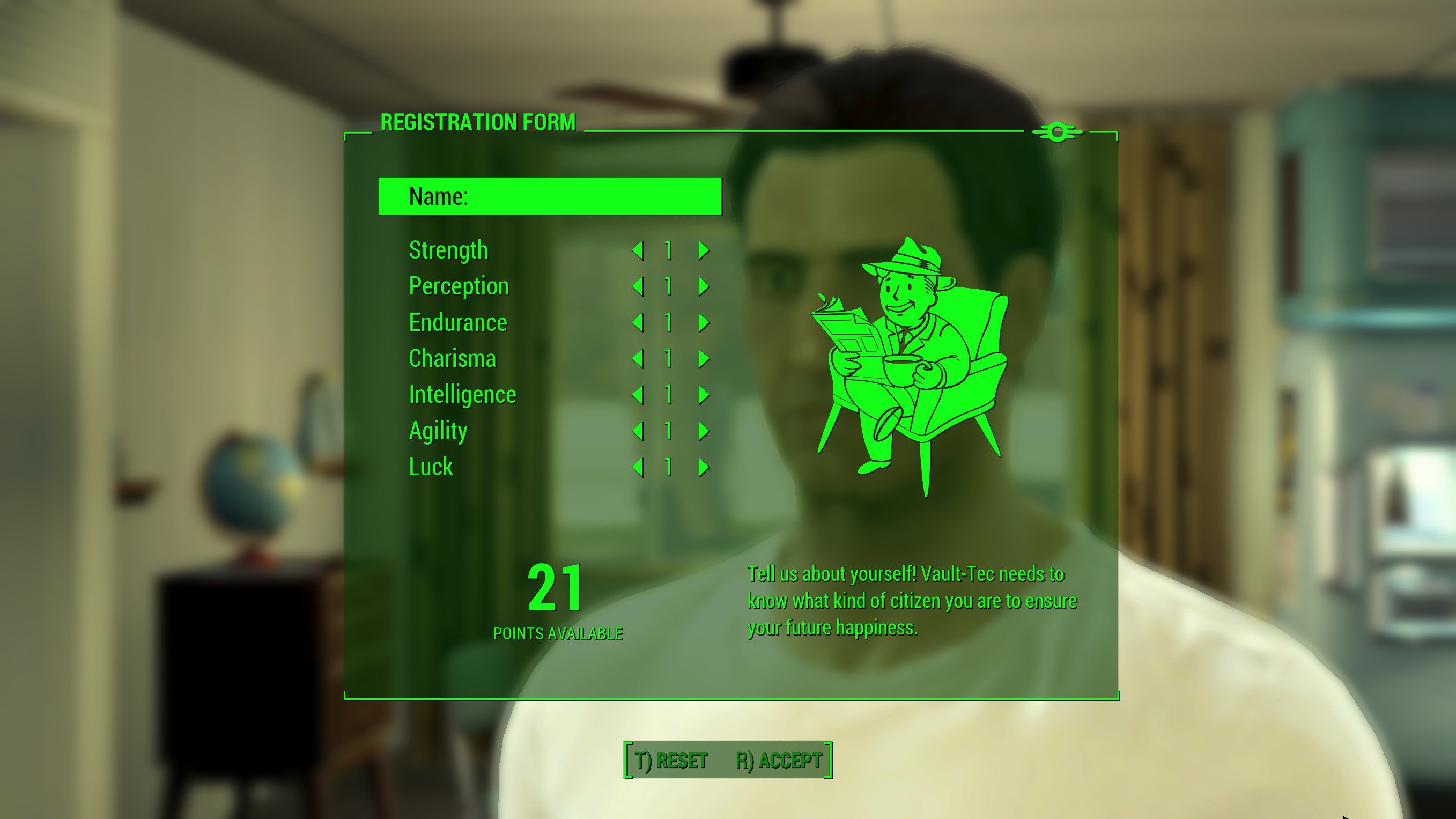
S.P.E.C.I.A.L. has endured in contemporary Fallout titles such as Fallout 4.
S.P.E.C.I.A.L. has endured in contemporary Fallout titles such as Fallout 4.
CHRIS TAYLOR
There were a lot of off-the-cuff meetings, and I think that's credit to the small team that we had, and the fact that we weren't the primary focus at Interplay at that time, because they got the D&D license and were more interested in Dungeons & Dragons games. While they still supported us and obviously gave us paychecks, we weren't as monitored quite as closely as we had been before the D&D license came on. So, we had a lot of freedom and flexibility.
TIM CAIN
Also, RPGs didn't feel like they were cutting edge. An RPG that had been out for three or four months didn't feel like it had lost any of its luster, where, if you were playing a shooter or a flight simulator—especially back then when technology was changing so dramatically—one that came out six months later would be dramatically improved from the one that came out earlier, and many players would say, "Eh, I don't want to play the [old] one. I want to play this new one."
BRIAN FARGO
TSR was not going strong at the time. I'm sure there were other people interested in the license. We certainly weren't the only ones, but I wasn't up against Electronic Arts, or Activision, or any [other big studios]. In fact, I remember after I signed the D&D license, Bruno Bonnell of Infogrames, they were doing great with their Asterix, these licensed cartoon characters in France. Things were very licensed at the time, but more in the lines of mainstream, [cartoons]-on-Saturday-mornings type stuff. Bruno said, "You got the Dungeons & Dragons rights? Ugh. Nicheware for nerds. You'll just never learn."
That's what he said. He poo-pooed all over the idea. There were people who thought it was too niche and stupid. I don't think I've ever done a product that other people thought was a good idea.
Fallout’s scrappy but committed team plugged along. When Tim Cain expressed need for more developers to speed things along, one of Brian Fargo's best producers rose to the occasion.
FEARGUS URQUHART
I was a producer, and it wasn't until they put me in charge of the RPG division in '96—and Fallout was not immediately a part of that—that's around when Tim [Cain] and I talked, and they really needed support to staff their team up and really have the producer support to get that game done. That's how it became a part of [the RPG division] and how I got involved. I'm a big RPG nerd, and it looked so cool.
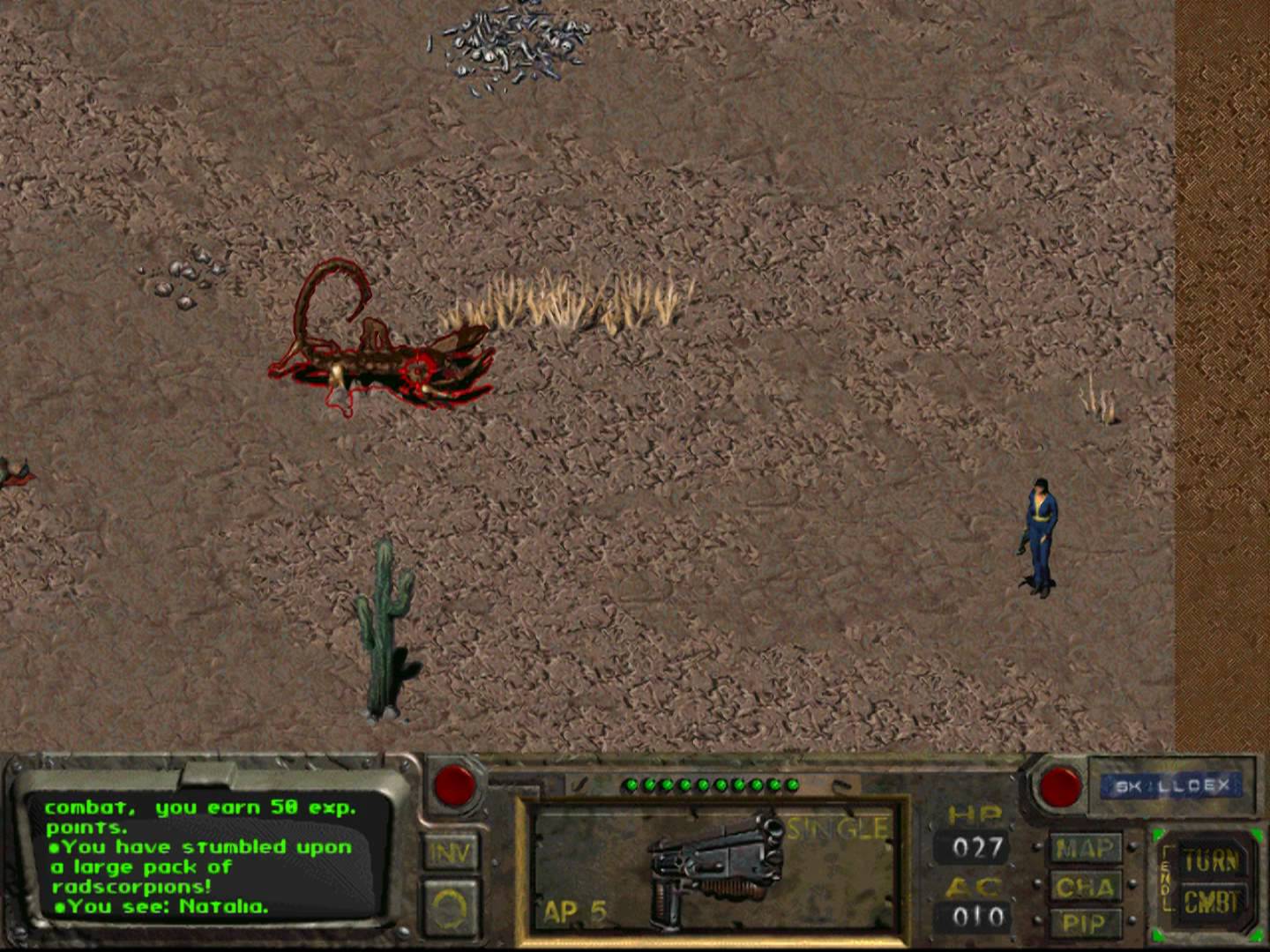
BRIAN FARGO
I think you have to start somewhere in an organization, and you need to be noticed. I think it's a function of getting your foot in the door, and then being able to relate bugs and comments back on products.
You're able to determine people's sensibilities based on what they report. If they're reporting really insightful things, then that's going to tell you how much they understand the creation process of what we're doing. Anybody who moved up from QA, including Feargus and several other people, showed an aptitude in their ability to have insight into the process of what made a game fun.
To this day, some of Fallout's developers remain convinced that Interplay's acquisition of the Dungeons & Dragons license threatened development of their game. Others are less certain.
FEARGUS URQUHART
I think I was in more of the conversations with Brian, and I don't think so. I mean, if we'd gone six months and the game was in disarray, yes, probably. But Brian didn't just cancel games. There were games that needed to be cancelled, and they didn't, so I think we were far away from that.
BRIAN FARGO
I remember when we got the Star Trek license, people said, "Why did you get that? It's old." If you think about it, the first [game] Interplay did was 25th Anniversary. The show wasn't even on the air anymore, yet the game was a big success.
FEARGUS URQUHART
Now, that doesn't mean that Brian couldn't have said some stuff to people suggesting that it get done quickly, and that he didn't want to keep paying for a game that didn't have a license, and that there were people questioning that the game was worthwhile that it didn't have a license—he may have said that stuff to people. But just me knowing Brian and working closely with him, I knew we had quite a runway.
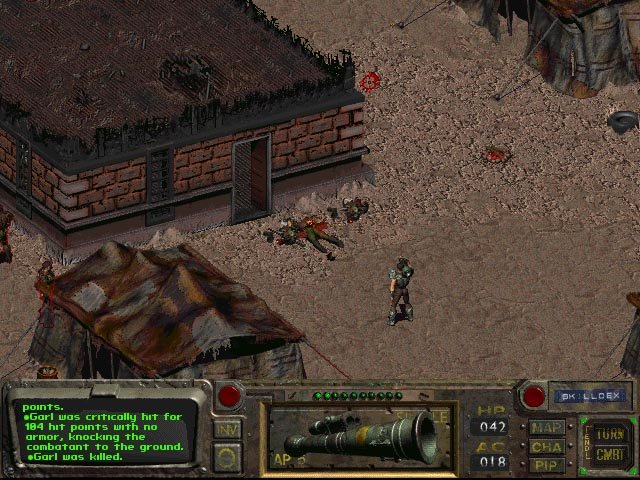
Leonard Boyarsky considered Fallout his baby. Tim Cain was responsible for writing code, but Boyarsky was at the forefront of defining its look and much of its feel. His interest extended to the game’s cinematic introduction, which he knew would be most players’ introduction to the world he and the team had created.
TIM CAIN
We were making this game, we're all young guys, and we were going over the top with violence. I remember going to Austin to demo the game to Steve, and I remember showing him the flamethrower, which was one of the few area-of-effect weapons that had huge particle effects, and [anyone set on fire] walked around screaming. He laughed.
I said, "Is that okay for the violence level?" He said, "Yeah! Do more." We were like, "Yeah!"
LEONARD BOYARSKY
The first thing was, we knew we needed to make an intro. The second thing was, we need to convey as much about the world as we can, but we can't show people up close. We just didn't have the technology. I'm sure there were people who could make really good-looking, 3D models but we weren't those people. And we didn't have the time, also.
So we said, "What can we do? Oh, we'll put them on a TV set that the camera's pulling back from, before you see any human beings on it." I felt like the intro was very successful at conveying the mood and tone we wanted to convey. Tim wrote the narration, the "War never changes" part, and Jason and I found a bunch of old pictures and put them together to work underneath that.
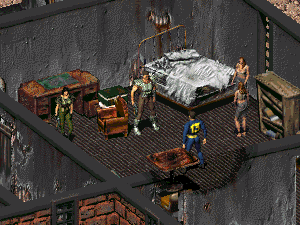
ROB NESLER
There were talking heads that needed to be made, so I assisted in gathering the talent for and managing that process. I think they called me the 3D art director, in that I assembled a team of 3D artists to do facial modeling toward the eventual goal of facial animation. That involved some very clever modelers from the entertainment industry as well as the Natural History Museum who were used to modeling in clay.
The overseer's head was our first, I think. I believe we sculpted that. There was a process for getting those heads made and then digitized. Then those would be given to the team.
TIM CAIN
Fred Hatch, my assistant producer, was renting a room in my house, and he came home one night and said the next day he was going to meet Ron Perlman to record the opening of Fallout. I was eating dinner and watching Simpsons, and he said, "This is what I've got for Ron Perlman to read." I don't remember what it said, but I didn't like it. He said, "Yeah, I don't really like it either."
So during the commercial interruption on Simpsons, I wrote the "War. War never changes." That whole opening paragraph: "War never changes, Hitler, China, superpowers... All that stuff, and uranium being used for war and fueling war." All of that was written during The Simpsons.
LEONARD BOYARSKY
We started off with the Vault Boy, and we built it around the ads and some news reports. Jason and I came up with the idea for it in an afternoon. We decided, roughly, "Here's what the shots are going to be." It was really rough. For instance, when I went to do the scene that turned into the execution, it was just supposed to be something about a newsreel like, "Our boys are fighting for peace," or whatever, and you saw a firefight going on.
I started working on it and decided it was going to be really difficult to show, to make it dramatic and to stage it. I thought about pushing it further, making it ridiculous and over the top. I don't know where the idea came from, but I do know that as soon as I had the idea about a guy being executed, I turned around to Jason and said, "I'm going to have him execute this guy in the middle of the street. What do you think?"
He turned to me and said, "That's a great idea."
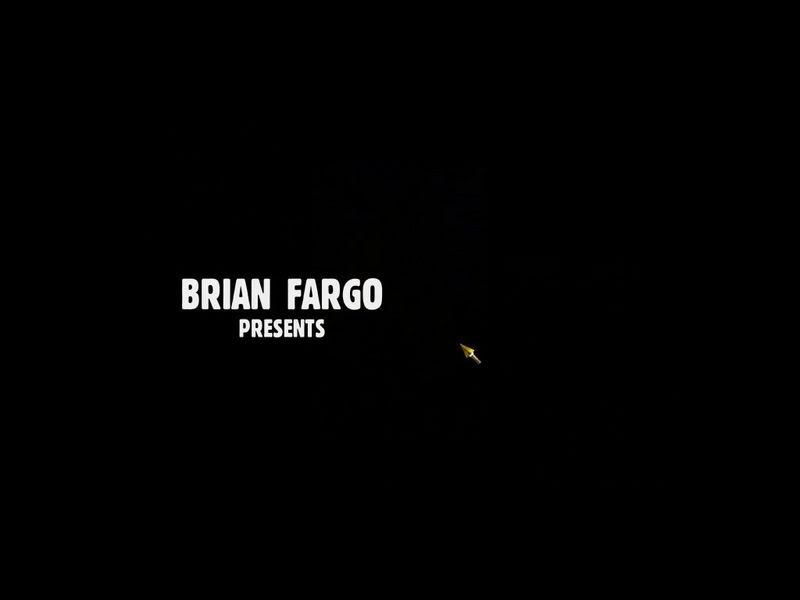
TIM CAIN
Before Fred, my assistant producer, went to the VO session the next day, I said, "Just have Ron Perlman read both. Read what this guy wrote, and then read what this guy wrote so we can hear him say both, and we'll decide later which one we like best." To put the cherry on the sundae of that story, I was really nervous about what I was going to sound like, and Fred was supposed to leave at four o'clock from the VO studio and drive back down to Irvine; the studio was up in Hollywood.
He calls me at 3:30 and says, "Hey, Ron Perlman had two tickets to a baseball game up at the LA stadium. Can I go to that? I'll just get this stuff to you tomorrow." I was like, "Yes, but did he say anything about the dialogue?" Fred said, "I can't really talk about it, I need to get to the stadium." This was pre-smartphone; he was calling us from the studio. We had to wait until the next morning to hear what the stuff sounded like.
LEONARD BOYARSKY
While I was animating the execution, I decided I would make them turn to the camera and wave. I go, "Jason, how much will you give me if I make these guys wave at the camera?" He said, "If you do it, I'll give you twenty bucks."
I don't think he ever paid up, but I might not be remembering this correctly. But we'd do things like that. We'd come up with these ridiculous ideas and kind of dare each other to do them. I said, "Tim's either going to freak out when he sees this, or think it's hilarious." We'd just do things and show them to people after they were done. We didn't get OKs for any of this stuff. We didn't run it by anybody. It was just us sitting in a room going, "This is what it's going to be." As we worked on it, it just became what it was.
CHRIS TAYLOR
We had great voice actors. That's one area where we were really fortunate, people whom I had idolized while growing up. Going to those recording sessions and meeting Ron Perlman in real life? I mean... Being present for the birth of my kids is slightly more important than meeting Ron Perlman, but it's close.
LEONARD BOYARSKY
I knew I wanted a haunting song for the intro. I didn't know where it came from. Years later I remember, Oh, that's the end of Dr. Strangelove where they're playing We'll Meet Again while bombs are dropping. That's what I was trying to evoke. We were trying to find a song but didn't have any ideas. Gary Platner, an artist, came in one day and said, "I just heard this song that we have to use." It was I Don't Want to Set The World






































